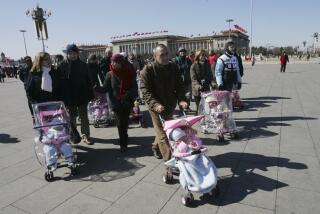U.S. Ready to Back Global Rules for Foreign Adoption
- Share via
WASHINGTON — After years of delay, the United States is poised to embrace a multinational treaty that creates the first ground rules for intercountry adoptions--an effort meant to curtail abuses of orphaned children and help adults who want to become their parents.
The Senate ratified the treaty without debate this week, and President Clinton is expected soon to sign legislation implementing it.
Congressional approval had been anxiously anticipated by many adoption professionals because the United States is by far the most important player in the fast-growing, loosely regulated and often-turbulent arena of intercountry adoptions.
The treaty creates central authorities in each country ratifying the pact to oversee intercountry adoptions and coordinate policy with other nations. In the United States, that agency will be the State Department.
It also requires countries to establish accreditation standards for adoption agencies, a step that promises stricter oversight of such groups.
International officials hope that the treaty, now reinforced by U.S. leadership, will help bring order to a process vulnerable to such abuses as extortion of would-be parents and trafficking of children. That new order will take shape as the more than 40 countries that have ratified or acceded to the treaty begin to cooperate in enforcing standards for adoption professionals.
“We can’t underestimate the importance of ratification” by the United States, said Susan Soon-Keum Cox, vice president of public policy for Holt International Children’s Services, an adoption agency based in Eugene, Ore. “There will be a worldwide recognition that [intercountry] adoption is important. It won’t be under the radar.”
The treaty comes as record numbers of Americans are going outside the country to adopt children. More than 16,000 orphaned children immigrated to the United States last year via adoptions, up from about 7,000 in 1990, according to the State Department.
But increasingly, many would-be parents have reported horror stories as they travel to Eastern Europe, Asia or Latin America to adopt. Some encounter unscrupulous brokers who squeeze them for additional fees.
“You get there and all of a sudden they say, ‘We can’t arrange this unless you provide so many thousands of dollars more,’ ” said Allan Hazlett, president of the American Academy of Adoption Attorneys.
Cox said she has heard of unexpected fees up to $50,000 or more.
Other parents are given misleading or incomplete records of the medical and family histories of their newly adopted children--a problem that can have devastating effects on the parents and children alike.
As the volume of intercountry adoptions has increased, concerns have grown about reports of child smuggling and kidnapping. Although documentation of these reports remains at best sketchy, adoption experts said the treaty would intensify and coordinate efforts to identify and stem such crimes.
Other nations that have ratified the treaty include Mexico, El Salvador, Brazil, Israel, Poland, Romania, the Czech Republic and the Philippines.
Those that have yet to ratify it include the four countries that accounted for the bulk of intercountry adoptions by Americans in 1999: Russia, China, South Korea and Guatemala. But adoption experts expressed hope that U.S. ratification will spur similar action by these countries.
The treaty, known as the Hague Convention on Intercountry Adoptions, was written in 1993. U.S. officials signed it a year later, signaling the country’s intent to ratify it. But the road to ratification proved long and contentious.
At one point this year, congressional approval was held up by a proposal to limit international adoptions by gays and lesbians. That effort was led by Rep. Christopher H. Smith (R-N.J.), a senior member of the House International Relations Committee.
Smith squared off against lawmakers from both parties who saw his issue as a distraction and wanted to move on the treaty as quickly as possible. At stake, some adoption experts said, was the possibility of delays in adoptions of children from Romania, Russia, China, South Korea and Guatemala--countries that might view dimly U.S. refusal to abide by the nascent effort at international regulation and cooperation.
Eventually, Smith’s issue--and separate concerns about the scope of federal adoption bureaucracy raised by Sen. Sam Brownback (R-Kan.)--were settled through quiet compromise.
The New Jersey lawmaker claimed afterward that he had won a victory for countries that might seek to enforce their own rules about which prospective parents are fit to adopt. But his opponents said the language in the final legislation did not approach what Smith originally sought. There was no specific reference, for instance, to gays or lesbians.
In a news release, Smith praised the treaty for “securing families for orphaned children who otherwise would be facing an ominous future in government-operated orphanages.”
Pro-adoption sentiment runs strong in Congress, where 136 lawmakers are members of an adoption coalition. Several members have adopted children from overseas, including Brownback.
Another is Rep. William D. Delahunt (D-Mass.), who adopted a Vietnamese girl in 1975 during the evacuation of Saigon. He was part of a group, including Sen. Jesse Helms (R-N.C.), that gave the treaty its final push to approval.
“The international adoption process is an emotional roller coaster for everyone involved,” Delahunt said after final Senate action Wednesday.
More to Read
Sign up for Essential California
The most important California stories and recommendations in your inbox every morning.
You may occasionally receive promotional content from the Los Angeles Times.










